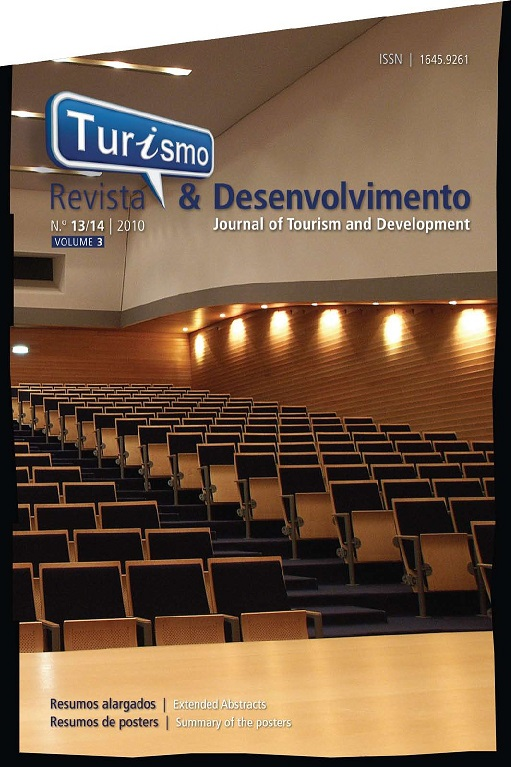Local economic development through heritage tourism
Resumo
Objectives | Heritage tourism is increasingly being recognized as a development tool for areas facing economic difficulties. Economic restructuring in rural areas have led to such effects as: the decline of the primary sector, deindustrialization, environment degradation, out– migration and unemployment. In some rural areas and small historical towns experiencing economic difficulties, natural and historical heritage resources are being used as the last resort for tourism development as the purpose for the revitalization of an economic base. The thesis looks at the local economic development through heritage tourism as the result of the importance of heritage resources for preservation and economical regeneration in the less developed areas such as Allariz. The local economic development refers that different stakeholders such as municipalities and entrepreneurs and community members collaborated and participated in the heritage tourism development in order to create positive economic outcomes in a given locality. This paper intends first to examine responses from Allariz, a small town in Northern Spain, which was currently suffering an economic downturn. Second, the research will identify key stakeholders and their role in heritage tourism development. Finally, the paper will try to identify how collaboration, participation and strategies of different stakeholders shape the economic outcomes. Main Research Question: What strategies are being used by key stakeholders to develop heritage tourism and achieve local economic development? Subsidiary questions for the research problem are:
Question 1: What are the characteristics of heritage tourism development in Allariz?
Objective 1: To identify the context for heritage tourism development.
Question 2: What kind of social processes explain a failure or success of heritage tourism development?
Objective 2: To identify the key stakeholders and social processes in heritage tourism development.
Question 3: How do the collaboration, participation and strategies of different stakeholders shape economic outcomes?
Objective 3: To examine the economic outcomes in relation to social processes.
Methodology | The research approach for this work attempts to include both qualitative and quantitative methods, the latter applied in order to secure qualitative data validity and reliability. Quantitative data however,will prove secondary to the qualitative approach, although the intention is to provide answers to a number of research arguments broached in the thesis, thereby strengthening the qualitative data findings. Research material will be gathered from semi-structured interviews, participant observations and statistical data sources. In addition, secondary source material gleaned from newspapers, commune plans and projects, brochures and articles related to the topic are intended to be used. The fieldwork is to be carried out between the dates of early January and the middle of February 2010. Stakeholders will be identified using the snowball sampling method. Approximately 25 semi-structured interviews will be conducted. One will use different statistic data in relation to the topic.
Main results and contributions | Since the topic of the research project revolved around heritage tourism, the town of Allariz was chosen, as one of the most important historical and artistic sites in Galicia and its history is dating since 12th century. The town has about 5.000 inhabitants in 16 parishes. The surroundings of the river Arnoia also constitute an important natural attraction. Tourism represents the main economical resource in Allariz, but its exploitation is relatively recent. Before the 1989, the Allariz town experienced economic stagnation as the result of the environment degradation, depopulation and unemployment. The following quotation demonstrates the situation at the end of the 80’s: “At the end of the 80´s, anybody who would visit Allariz in a working day would find, as in many other villages from the interior part of Galicia, a village “half deserted”, with no people in the street, with most of the shops closed, a “decadent place”. With a river hidden by the” undergrowth”…was the image of an “announced death” (www.allariz.com). However in 1989, changes within the local government resulted in the implementation of tourist strategies that placed emphasis on place and local economic development.Allariz then channelled resources to heritage tourism,such as natural, cultural, artistic, historical, archaeological and ethnographical heritage into an economic resource. Public and private partnerships have become actively involved, focusing on the improvement of the infrastructure, the transformation of historical buildings directly related to the tourist industry. Provided the tourism service and focused on the natural and historical heritage preservation. The Spanish national statistical database shows an increase in the population density in the area. More detailed analysis will be conducted in the future.
Limitations | The limitations are expected to be the limit of time. The fact, obtaining as much objective results as possible it is time consuming. Being the main researcher of the project foreigner, then that may create problems in the access to local information. Finally, the fieldwork will be carried out during winter, during the low season, and that may be another limitation to be taken into account.
Conclusions | Heritage tourism as developing tool may play a significant role for rural and small historical town’s economic revitalization. However, many factors must be taken into account. Community participation, partnership and collaboration between private and public stakeholders, knowledge of profit sharing and preservation of natural and historical heritage, access to other markets and well-coordinated economic strategies are the key elements to the success or failure of heritage tourism development. As the result of these, heritage tourism development has proved to be the significant contributor to Allariz economy that have made possible to achieve positive economic outcomes.





